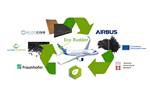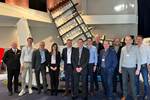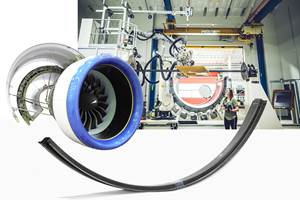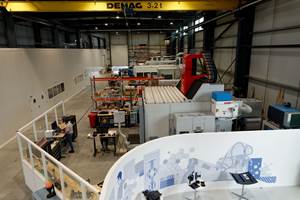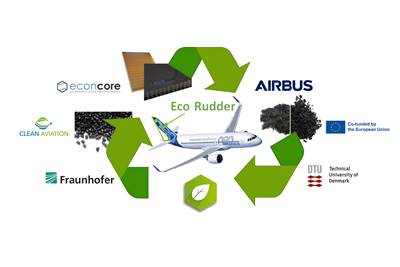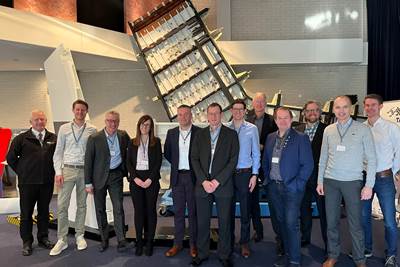GKN Aerospace opens new Netherlands-based Global Technology Center
The Hoogeveen facility provides an R&D space focused on lightweight thermoplastic composites and advanced electrical cabling systems for next-gen aircraft.
Photo Credit: GKN Aerospace
On May 8, GKN Aerospace (Redditch, U.K.) opened a Global Technology Center (GTC) in Hoogeveen, the Netherlands, to provide an innovation ecosystem for composites research and accelerate the development of the latest sustainable aviation technologies in the region as part of an €80 million investment package from GKN Aerospace. The center focuses on lightweight thermoplastic composites and advanced electrical cabling systems for next-generation aircraft.
The launch was a significant affair for GKN Aerospace, the local region and the country. Attendees included Karel Loohuis, mayor of Hoogeveen; Michiel Sweers, deputy director-general for enterprise and innovation, and director of the Innovation and Knowledge Department at the Ministry of Economic Affairs and Climate Policy; David Paja, CEO of GKN Aerospace; and John Pritchard, president civil airframe GKN Aerospace, who presented during the opening ceremony.
Arnt Offringa, director of the newly opened GKN Fokker Global Technology Center, hosted the ceremony. He articulated, “The GKN Fokker GTC’s thermoplastics research programs aim to develop novel thermoplastic materials and processes for scalable, affordable, high-volume production for next-generation single-aisle aircraft. Advanced lightweight thermoplastic composites offer an overall weight saving of at least 10% compared to traditional aircraft materials, are more efficient to produce than thermoset structures and have high fire safety and recyclability. GKN Aerospace’s broader sustainability strategy is to further lightweight aerospace structures at an acceptable cost and performance, and thermoplastics are an enabler for multiple sustainability targets throughout the aerospace value chain and provide the massive potential for high build rate environments with a recycling agenda for fully reprocessed composite parts, including polymer elements. These characteristics make them a cheaper, more sustainable solution for aircraft structural components, which is why we invest in their future.”
GKN Fokker and Mikrosam (Prilep, Macedonia) recently produced the Multifunctional Fuselage Demonstrator’s (MFFD) floor beams, which take advantage of automated fiber placement (AFP), and 6-meter spars for thermoplastic composite rudders, elevators, and tails which feature out-of-autoclave (OOA) consolidation at the Hoogeveen GTC. The MFFD is paving the way for next-generation airframes made using thermoplastic composites instead of primarily thermoset composites — mostly carbon fiber-reinforced epoxy — used for aerostructures today.
Photo Credit: Stewart Mitchell
The Hoogeveen GTC will also host an extensive R&D electrification program in collaboration with the GKN Fokker locations in Hoogerheide and Papendrecht. The electrification program researches and develops advanced cabling and distribution systems to support the increased electrical power required for electric aircraft and hydrogen fuel cell systems.
President of civil airframe GKN Aerospace John Pritchard also spoke at the Hoogeveen launch event, highlighting, “GKN Aerospace is currently leading sustainable aviation projects in multiple countries, from its GTCs in Bristol, U.K., Trollhättan, Sweden, and Fort Worth, U.S. Each center has its own area of ​​expertise and ecosystems, including universities, knowledge institutes and partners. Cooperation between companies and between regions is crucial for the aviation industry to become emission-free.”
“The Hoogeveen GTC reflects our continued commitment to the Netherlands,” he continued. “The center will help accelerate the adoption of lightweight, cost-effective thermoplastic aerostructures, crucial for the sustainable future of aviation. By ensuring that the Netherlands can develop these technologies and produce them throughout the Dutch supply chain, we maintain our leading position and underline our commitment to sustainability.”
Related Content
Combining multifunctional thermoplastic composites, additive manufacturing for next-gen airframe structures
The DOMMINIO project combines AFP with 3D printed gyroid cores, embedded SHM sensors and smart materials for induction-driven disassembly of parts at end of life.
Read MoreMFFD longitudinal seams welded, world's largest CFRTP fuselage successfully completed
Fraunhofer IFAM and partners have completed left and right welds connecting the upper and lower fuselage halves and sent the 8×4-meter full-scale section to ZAL for integration with a cabin crown module and testing.
Read MoreThe potential for thermoplastic composite nacelles
Collins Aerospace draws on global team, decades of experience to demonstrate large, curved AFP and welded structures for the next generation of aircraft.
Read MorePlant tour: Daher Shap’in TechCenter and composites production plant, Saint-Aignan-de-Grandlieu, France
Co-located R&D and production advance OOA thermosets, thermoplastics, welding, recycling and digital technologies for faster processing and certification of lighter, more sustainable composites.
Read MoreRead Next
EcoRudder project to develop thermoplastic composite aircraft rudder
Airbus, EconCore, Fraunhofer and the Technical University of Denmark will produce a potentially recyclable rudder from thermoplastic honeycomb sandwich composites.
Read MoreSolvay, GKN Aerospace renew collaboration agreement
Both companies aim to expand the use of thermoplastic composite materials on high-rate aerospace structures.
Read MoreNext-gen fan blades: Hybrid twin RTM, printed sensors, laser shock disassembly
MORPHO project demonstrates blade with 20% faster RTM cure cycle, uses AI-based monitoring for improved maintenance/life cycle management and proves laser shock disassembly for recycling.
Read More